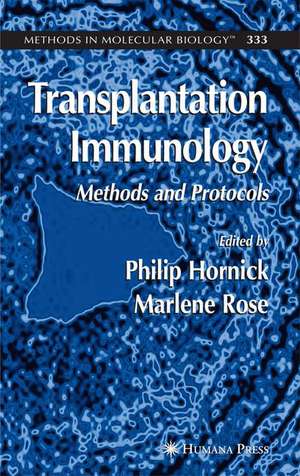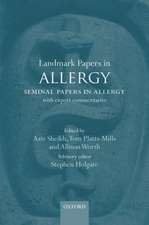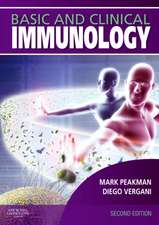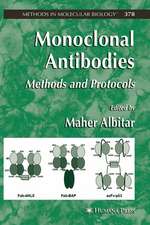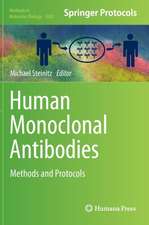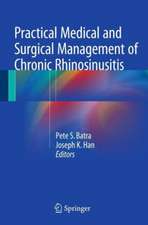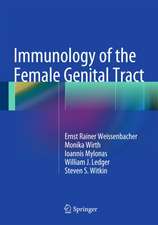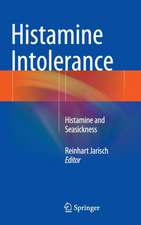Transplantation Immunology: Methods and Protocols: Methods in Molecular Biology, cartea 333
Editat de Philip Hornicken Limba Engleză Hardback – mar 2006
| Toate formatele și edițiile | Preț | Express |
|---|---|---|
| Paperback (1) | 1101.00 lei 43-57 zile | |
| Humana Press Inc. – dec 2010 | 1101.00 lei 43-57 zile | |
| Hardback (1) | 1110.32 lei 43-57 zile | |
| Humana Press Inc. – mar 2006 | 1110.32 lei 43-57 zile |
Din seria Methods in Molecular Biology
- 9%
 Preț: 791.59 lei
Preț: 791.59 lei - 23%
 Preț: 598.56 lei
Preț: 598.56 lei - 20%
 Preț: 882.95 lei
Preț: 882.95 lei -
 Preț: 252.04 lei
Preț: 252.04 lei - 5%
 Preț: 802.69 lei
Preț: 802.69 lei - 5%
 Preț: 729.61 lei
Preț: 729.61 lei - 5%
 Preț: 731.43 lei
Preț: 731.43 lei - 5%
 Preț: 741.30 lei
Preț: 741.30 lei - 5%
 Preț: 747.16 lei
Preț: 747.16 lei - 15%
 Preț: 663.45 lei
Preț: 663.45 lei - 18%
 Preț: 1025.34 lei
Preț: 1025.34 lei - 5%
 Preț: 734.57 lei
Preț: 734.57 lei - 18%
 Preț: 914.20 lei
Preț: 914.20 lei - 15%
 Preț: 664.61 lei
Preț: 664.61 lei - 15%
 Preț: 654.12 lei
Preț: 654.12 lei - 18%
 Preț: 1414.74 lei
Preț: 1414.74 lei - 5%
 Preț: 742.60 lei
Preț: 742.60 lei - 20%
 Preț: 821.63 lei
Preț: 821.63 lei - 18%
 Preț: 972.30 lei
Preț: 972.30 lei - 15%
 Preț: 660.49 lei
Preț: 660.49 lei - 5%
 Preț: 738.41 lei
Preț: 738.41 lei - 18%
 Preț: 984.92 lei
Preț: 984.92 lei - 5%
 Preț: 733.29 lei
Preț: 733.29 lei -
 Preț: 392.58 lei
Preț: 392.58 lei - 5%
 Preț: 746.26 lei
Preț: 746.26 lei - 18%
 Preț: 962.66 lei
Preț: 962.66 lei - 23%
 Preț: 860.21 lei
Preț: 860.21 lei - 15%
 Preț: 652.64 lei
Preț: 652.64 lei - 5%
 Preț: 1055.50 lei
Preț: 1055.50 lei - 23%
 Preț: 883.85 lei
Preț: 883.85 lei - 19%
 Preț: 491.88 lei
Preț: 491.88 lei - 5%
 Preț: 1038.84 lei
Preț: 1038.84 lei - 5%
 Preț: 524.15 lei
Preț: 524.15 lei - 18%
 Preț: 2122.34 lei
Preț: 2122.34 lei - 5%
 Preț: 1299.23 lei
Preț: 1299.23 lei - 5%
 Preț: 1339.10 lei
Preț: 1339.10 lei - 18%
 Preț: 1390.26 lei
Preț: 1390.26 lei - 18%
 Preț: 1395.63 lei
Preț: 1395.63 lei - 18%
 Preț: 1129.65 lei
Preț: 1129.65 lei - 18%
 Preț: 1408.26 lei
Preț: 1408.26 lei - 18%
 Preț: 1124.92 lei
Preț: 1124.92 lei - 18%
 Preț: 966.27 lei
Preț: 966.27 lei - 5%
 Preț: 1299.99 lei
Preț: 1299.99 lei - 5%
 Preț: 1108.51 lei
Preț: 1108.51 lei - 5%
 Preț: 983.72 lei
Preț: 983.72 lei - 5%
 Preț: 728.16 lei
Preț: 728.16 lei - 18%
 Preț: 1118.62 lei
Preț: 1118.62 lei - 18%
 Preț: 955.25 lei
Preț: 955.25 lei - 5%
 Preț: 1035.60 lei
Preț: 1035.60 lei - 18%
 Preț: 1400.35 lei
Preț: 1400.35 lei
Preț: 1110.32 lei
Preț vechi: 1168.76 lei
-5% Nou
Puncte Express: 1665
Preț estimativ în valută:
212.46€ • 222.39$ • 176.83£
212.46€ • 222.39$ • 176.83£
Carte tipărită la comandă
Livrare economică 31 martie-14 aprilie
Preluare comenzi: 021 569.72.76
Specificații
ISBN-13: 9781588295446
ISBN-10: 1588295443
Pagini: 429
Ilustrații: X, 430 p. 54 illus.
Dimensiuni: 155 x 235 x 28 mm
Greutate: 0.82 kg
Ediția:2006
Editura: Humana Press Inc.
Colecția Humana
Seria Methods in Molecular Biology
Locul publicării:Totowa, NJ, United States
ISBN-10: 1588295443
Pagini: 429
Ilustrații: X, 430 p. 54 illus.
Dimensiuni: 155 x 235 x 28 mm
Greutate: 0.82 kg
Ediția:2006
Editura: Humana Press Inc.
Colecția Humana
Seria Methods in Molecular Biology
Locul publicării:Totowa, NJ, United States
Public țintă
ResearchCuprins
Current Status of Renal Transplantation.- Current Status of Liver Transplantation.- Current Status of Clinical Islet Cell Transplantation.- Current Status of Lung Transplantation.- Chronic Rejection in the Heart.- Direct and Indirect Allorecognition.- HLA Typing and Its Influence on Organ Transplantation.- Strategies for Gene Transfer to Solid Organs.- Nonviral Vectors.- Detection and Clinical Relevance of Antibodies After Transplantation.- 11 Reprogramming the Immune System Using Antibodies.- In Vitro Assays for Immune Monitoring in Transplantation.- Proteomics and Laser Microdissection.- Real-Time Quantitative Polymerase Chain Reaction in Cardiac Transplant Research.- Organ Preservation.- Pharmacological Manipulation of the Rejection Response.- Experimental Models of Graft Arteriosclerosis.
Textul de pe ultima copertă
Technical innovations in the laboratory over the past ten years have greatly improved our understanding of the immunological mechanisms of transplanted organ rejection. In Transplantation Immunology: Methods and Protocols, leading experts in solid organ transplantation review the current status of the field and describe cutting-edge techniques for detecting the immune response to the allografted organ. The authors present the latest techniques for HLA typing, detecting HLA antibodies, and monitoring T-cell response, and examine more specialized methods of utilizing proteomics, laser dissection microscopy, and real-time polymerase chain reaction. The areas of tolerance induction and reprogramming of the immune system are also covered, along with a discussion of up-to-date methods of organ preservation, of today's optimal immunosuppressive drug regimens, as well as the difficulty of mimicking chronic rejection in experimental models. Introductory chapters provide a theoretical update on current practices in renal, liver, islet, and lung transplantation and on the pathways of antigen presentation and chronic rejection.
State of the art and highly practical, Transplantation Immunology: Methods and Protocols illuminates for clinicians and scientists-both newcomers and experts-the new world of detecting and monitoring patients' immunological responses to solid organ transplantation.
State of the art and highly practical, Transplantation Immunology: Methods and Protocols illuminates for clinicians and scientists-both newcomers and experts-the new world of detecting and monitoring patients' immunological responses to solid organ transplantation.
Caracteristici
Includes supplementary material: sn.pub/extras
